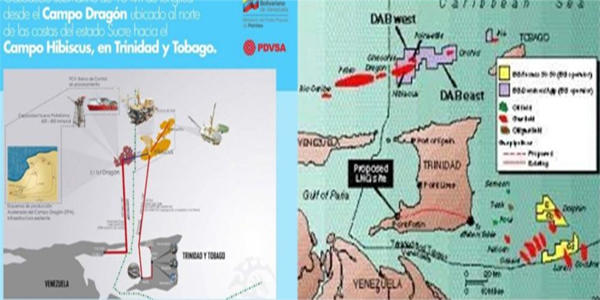
Raphael John-Lall, TT Guardian
PORT SPAIN
EnergiesNet.com 01 08 2024
Despite the threat of the US Government reimposing sanctions on Venezuela, Francisco Monaldi, Director of the Latin America Energy Program at the Center for Energy Studies at Rice University, is optimistic that the gas agreement signed between T&T and Venezuela last December will most likely succeed.
In December, a licence granted by Venezuela to Shell and the National Gas Company (NGC) of T&T will allow the companies to produce natural gas off the Venezuelan coast for 30 years.
The agreement follows last October’s decision by the US Department of the Treasury’s Office of Foreign Assets Control to ease sanctions on Venezuela, including those relating to Venezuela’s oil, gas, and gold sectors, by issuing several new general licences.
The Dragon field has prospect of pumping up to 350 million cubic metres of gas and is located in the northeast of Venezuela, near the maritime border with T&T. Dragon is adjacent to fields in this country operated by Shell.
Prime Minister Dr Keith Rowley stressed the importance of this agreement for T&T’s economy and future after it was signed.
“To have entered into this agreement in 2023, to open this door to allow us with the infrastructure on the ground in Trinidad, to access and process the raw material from below the ground in Venezuela, puts the two nations in a position to play a bigger and beneficial role in the world’s economy and for the benefit of the people of Venezuela and T&T.”
As for Venezuela, it is a major milestone as it would be the first time that it is exporting gas.
Critics have argued that the agreement is precarious as it all depends on US sanctions relief, as the US Government has made clear it can resume sanctions depending on if democratic elections are held.
Venezuela’s state-owned energy company PDVSA discovered the Dragon field over a decade ago and built some infrastructure before US sanctions on Venezuela’s energy sector halted development. Though no US entities are involved in the project, companies and governments request a green light from Washington to avoid being slapped with secondary sanctions.
Monaldi told the Business Guardian there are many variables involved that could impact on how successful the project is.
“I think the agreement has a relatively high probability of success meaning that it will stay and the project will go on. I tend to think that for the Americans even if the political liberalisation, fails as is likely to happen, and President Maduro stays in power with elections that are not very competitive, I think the Americans will not go back to the policy of sanctioning everything. I think that the general licences that they gave in October, that might go away and they might change it. That’s a likely eventuality.”
International market
In its first phase, the project is expected to yield an output of 185 million cubic feet per day of natural gas and it involves building a 17-kilometer pipeline from Venezuela’s Dragon field to Shell’s Hibiscus field in Trinidadian waters for the production of liquefied natural gas (LNG) and petrochemicals. Part of the output will be earmarked for export to international markets.
Monaldi pointed out that this agreement is likely to succeed as other major powers are involved such as the Europeans and they will benefit.
“They feel that it is important for geo-political reasons to provide additional sources of gas. On the other hand, it is not a major source of revenue for Maduro. I tend to think that this is one of the more likely licences to survive in a scenario if the US decides to reimpose some sanctions. However, there is always a scenario where Maduro goes to an extreme like Nicaragua where opposition candidates are imprisoned and so the agreement may be in jeopardy. Not only because of the sanctions but the companies involved might slow down given the uncertainties it may introduce.”
Year of elections
Monaldi said if he were in the shoes of companies like Shell, he would be “carefully monitoring” the volatile situation but optimistically added once all parties survive 2024, they should enter a period of stability with no new elections on the horizon and the initial test phase will be over.
“The more problematic year is 2024. After that whatever happens is likely to stay for a relatively longer time. This year is the year of uncertainty as it is the year of not only Venezuelan elections but American elections. That is the other big question to ask. If Mr Trump wins the elections in the US, that introduces another layer of uncertainty because it is not clear at all what type of policies he will implement in Venezuela. Mr Trump tends to be very dismissive of the policies of his opponents so he may go against certain policies of President Biden. However, I would think Mr Trump would establish some level of relationship with Venezuela. But this is all very hard to know and unpredictable.”
He said if a Biden administration continues then the licences will most likely survive, which will keep the gas project alive well into the future.
guardian.co.tt 01 07 2024












